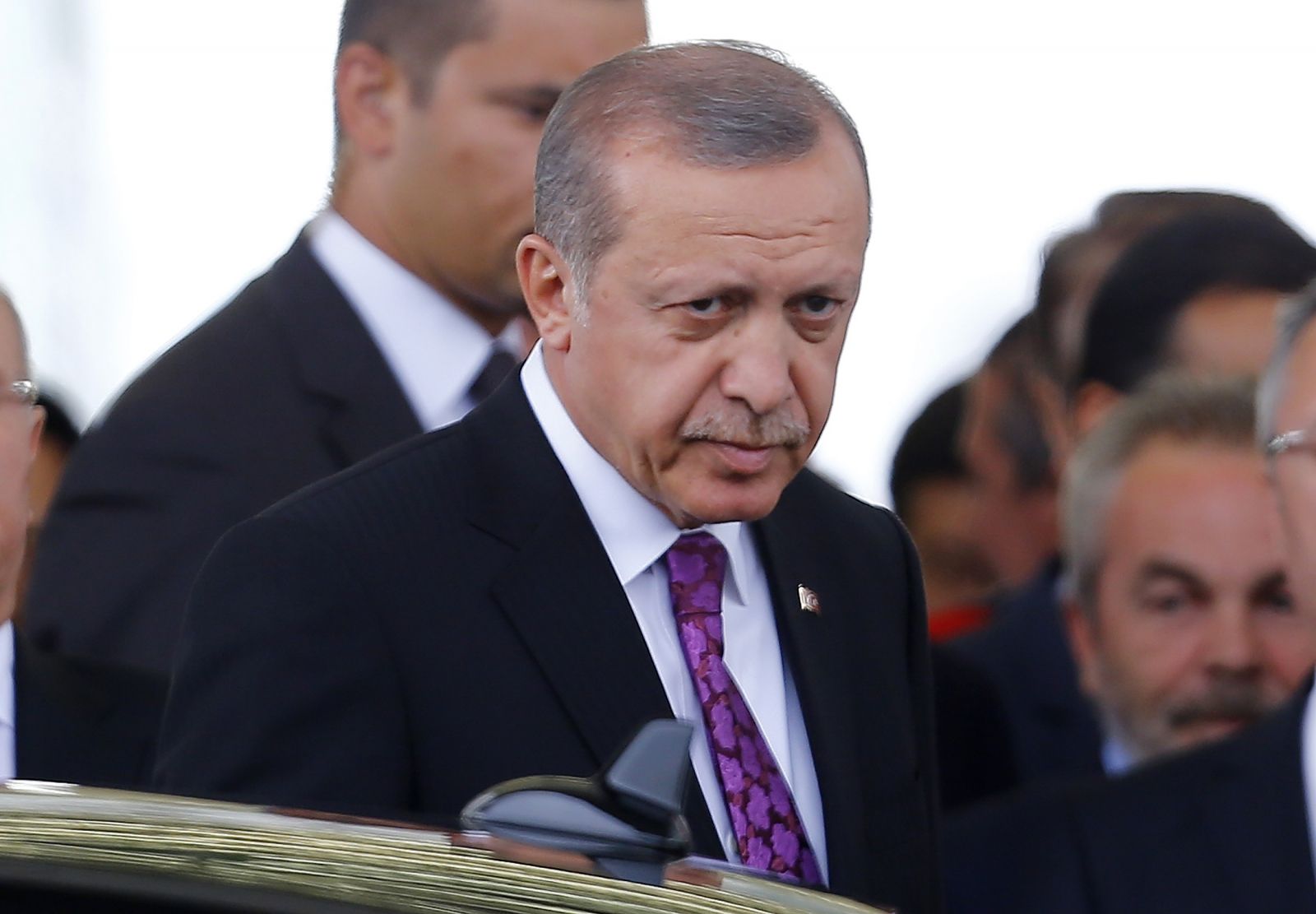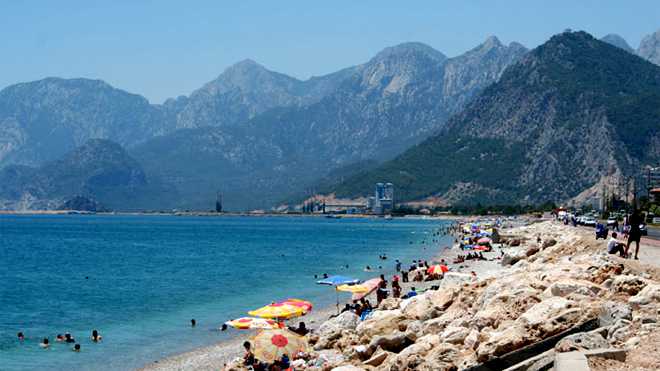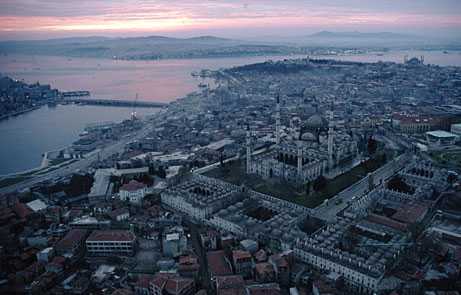By Ben Holland
July 20 (Bloomberg) — Two of Turkey’s most senior retired generals went on trial today in a case that may determine whether Prime Minister Recep Tayyip Erdogan succeeds in reining in the political power of his country’s military.
Sener Eruygur and Hursit Tolon, along with 54 other suspects including journalists, academics and business leaders, are accused of belonging to a group prosecutors say tried to undermine Erdogan by destabilizing the country with armed attacks. Tolon appeared at the court outside Istanbul while Eruygur didn’t attend, the official Anatolia News Agency said. The court set a date of Aug. 6 for the next hearing.
The case is a sign that Erdogan is gaining the upper hand in a six-year power struggle with an army suspicious of his Islamist background. It may strengthen the prime minister’s push to get Turkey into the European Union, which requires civilian control over the military.
“Turkey is coming to a historic crossroads and there’s a determination to confront the army,” said Akin Birdal, an opposition lawmaker and human-rights activist who was jailed by the military when it seized power in a 1980 coup. “Other NATO countries cleaned up their security forces after the Cold War, and Turkey needs to follow this through.”
The first Islamic country President Barack Obama visited, Turkey is NATO’s only Muslim member and a contributor to the alliance’s force in Afghanistan battling the Taliban.
New Law
The trial is a turnaround from two years ago, when the army initially blocked Erdogan’s presidential nominee, Abdullah Gul, 58, roiling markets. It also comes two weeks after Gul approved legislation allowing civil courts to try active military officers. While that law may not affect the case against Ergenekon, the group at the center of the trial, it could mean more civil scrutiny of the military in the future.
Birdal, of the Democratic Society Party, was one of the first people to make use of the new law. He filed charges on July 14 against Cevik Bir, a former deputy chief of general staff, accusing him of inciting nationalist gunmen who shot and severely injured Birdal in his office at the rights association in 1998. Bir hasn’t yet responded to the charges.
At stake, says Erdogan, is who runs a country that in the past half-century has suffered three coups by an army that sees itself as the guardian of Turkey’s secular system.
“Turkey isn’t a police state, it’s not an army state, it’s a democratic and secular state under the rule of law,” the prime minister said at a police graduation ceremony on July 7.
More Arrests
Not everyone accepts Erdogan’s interpretation of the case. Main opposition leader Deniz Baykal of the Republican People’s Party accuses the government of using the investigation to intimidate critics rather than to strengthen Turkey’s democracy.
“The more arrests we’ve seen, the more people whose only crime was opposition to the government were targeted,” said Soner Cagaptay, an analyst at the Washington Institute for Near East Policy. “And they’re not reforming in other EU areas: press freedom, gender equality, religious freedoms.”
Erdogan, 55, has chipped away at the military’s powers since coming to power in 2003. He ended army control over the National Security Council in 2003 and ignored objections that same year from the generals to his plan for pursuing the reunification of Cyprus.
The premier refused to back down when the army opposed Gul’s presidential nomination. He called an election and won with 47 percent of the vote, then successfully named Gul again for the post.
Markets Plunge
The dispute caused the benchmark ISE-100 stock index to plunge 7 percent in two days. Since Erdogan’s re-election, the index has lost 56 percent of its value, matching the 57 percent decline of the MSCI Emerging Markets Index. After average annual gross domestic product growth of about 7 percent in Erdogan’s first term of office, the economy expanded 1.1 percent in 2008. It will probably contract 5.1 percent this year, according to the International Monetary Fund.
Erdogan has been negotiating with the fund since May 2008 over lending for the country of 72 million. Foreign direct investment in the first five months of the year fell 52 percent from a year earlier to $3.6 billion, central bank data show.
“Differences between the army and government remain the major political risk” for investors in Turkey, said Nurhan Toguc, chief economist at Ata Invest in Istanbul.
The probe of Ergenekon began in 2007 and culminated 12 months ago with the arrest of Tolon and Eruygur, who were initially jailed and then released pending trial. All suspects deny the charges. Prosecutors filed an indictment against another 52 people today, the Anatolia agency said, without identifying any of them.
Suicide Threat
Opposition parties say Erdogan should change the army- designed 1982 constitution to allow trial of the generals who seized power in 1980. The 92-year-old Kenan Evren, the coup’s leader, told reporters he would commit suicide if brought to trial.
Though the Ergenekon case has been under way since last year, Tolon and Eruygur were indicted later and hadn’t been included in the trial until today. The hearing is taking place in a custom-built courtroom, the country’s largest, at Silivri in the outskirts of Istanbul.
It was constructed after judges were forced to delay the first trial session in October, because the hundreds of suspects, witnesses, lawyers and reporters couldn’t fit into the court.
To contact the reporter on this story; Ben Holland in Istanbul at bholland1@bloomberg.net.
Last Updated: July 20, 2009 11:43 EDT
https://www.bloomberg.com/politics?pid=newsarchive&sid=a9Sle48If4.U









 Walter Leland Cronkite, Jr. (November 4, 1916 – July 17, 2009) was an American broadcast journalist, best known as anchorman for the CBS Evening News for 19 years (1962-81). During the heyday of CBS News in the 1960s and 1970s, he was often cited in viewer opinion polls as “the most trusted man in America” because of his professional experience and kindly demeanor. Cronkite died on July 17, 2009, at the age of 92 from cerebrovascular disease, described by his son as complications from dementia.
Walter Leland Cronkite, Jr. (November 4, 1916 – July 17, 2009) was an American broadcast journalist, best known as anchorman for the CBS Evening News for 19 years (1962-81). During the heyday of CBS News in the 1960s and 1970s, he was often cited in viewer opinion polls as “the most trusted man in America” because of his professional experience and kindly demeanor. Cronkite died on July 17, 2009, at the age of 92 from cerebrovascular disease, described by his son as complications from dementia.